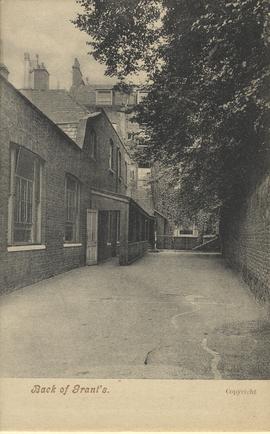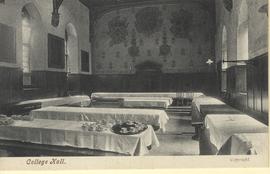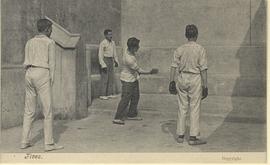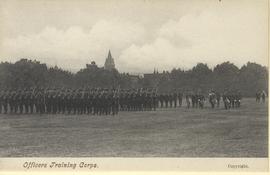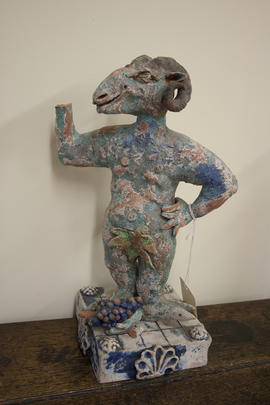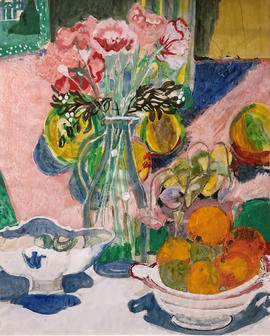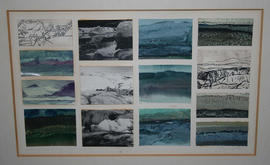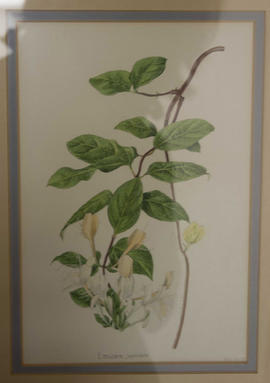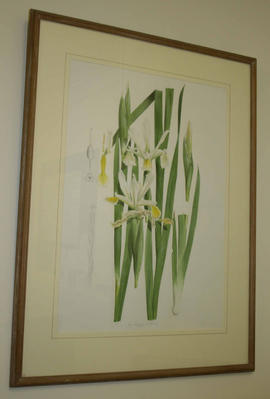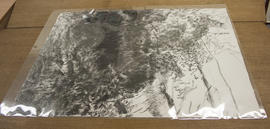One copy annotated on reverse by R.S. Chalk, as follows:
'Back of Grant’s 1918-24
A portion of the School precincts I naturally never once set eyes on during all those years. Except for Monitors (on official duty) no member of any one of the five Houses was allowed to set foot inside another.
This no doubt Grant’s Yard (somewhat more specious than its counterpart up RR next door). The windows are protected by wire-mesh because of the ‘Yard Game’ played there, the counterpart of RR Yard Game. This was a kind of miniature football played four-or-five-a side with a rubber ball about 4 inches in diameter. A very fast game (and too rough for me personally). If the ball was ‘popped’ on an iron spike or (more likely) ‘skied’ into GG Yard next door, it meant an outlay of 6d, on another, if available. We would call, “Thank-you ball Grant’s!!” Sometimes our ball would come back, but not often. (GG balls were never skied into RR Yard!)'
One copy annotated on reverse by R.S. Chalk, as follows:
'Morning/Evening Hall - Memories 1920-24
At Breakfast and (High) Tea in those days Hall was the exclusive domain of K.SS. The deeply resented invasion by Busby’s did not come till 1925.
Seniors sat at top table on right (note Captain’s chair), Juniors at bottom table, ever-alert for cries of “Election bag!-beggar!-brown bag! Etc.etc. Orders had to be executed at the run, so the zig-zag passage from the “Flinnery” to Seniors’ Table was a hazardous business, especially if carrying a full jug of ‘bag’ (normally my task as a Junior).
The chief of the ‘many customs’ referred to by L.E.T. was Toasting. When the open coal-fire in the centre was lit, Seniors would sit before it (before eating), and make two pieces of toast (more if desired) for each Under Election in their respective Rooms- call his name, and throw the toast to be caught or (failing that) retrieved from wherever it had fallen. As “breaking (ie going between) tables” was an offence, this often meant a lowly crawl for Juniors! (In my day, I developed considerable proficiency first in catching, later in making and throwing toasts). Unfortunately this custom degenerated into horseplay from 1925 and was abolished c.1926 after an accident to I.C. Allen.'
One copy annotated on reverse by R.S. Chalk, as follows:
'Memories 1918-1924
Fives was by far the most popular out of School game. Few could afford Racquets, and Tennis was never accepted as an alternative station till about 1923-4. *
The three Fives Courts in yard were continually patronised, especially by boarders. K.SS were particularly keen and proficient and participation in House ties was obligatory for all, I believe.
During the winter of 1921-2 I witnessed a memorable game of Fives played on the Court opposite Liddell’s Tree - the Headmaster (H.C.W.) and Mr (later Rev) R.E.C. Houghton (Master of VI) versus Rev. A.G.S. Raynor (Master of K.SS, just about to retire) and C.H. Taylor K.S. (later Cricket Blue). The Masters all showed great proficiency- not least the veteran ‘PiWi’. I wonder this game (witnessed by scorer) was never repeated.
*Yet, for all that, did we not produce C.H. Weinberger, Wimbledon Schoolboy Champion in 1919?'
One copy annotated on reverse by R.S. Chalk, as follows:
'Memories 1918-1924
This is presumably Inspection up Fields in days before World War I. Such an annual Inspection, even after that War was an impressive affair- conducted by this or that distinguished O.W. soldier. The Band (I remember) played Handle’s March from ‘Scipio’, on each occasion.
By the end of the War, the Q.T.C. (invariably referred to as “The Corps”) was all-important in School life. I suppose 80% of boys were in uniform all days of the week - the majority of the remainder waiting till their uniforms arrived. Few senior boys had School uniform, and the sudden announcement in Lent 1919 (after the Armistice) that all must wear Etons or tails from next Term caused panic.
Unless exempted on medical grounds, it was quite exceptional for anyone not to be in the Corps. Nor without reason - all were due to be called up at 18. It was not unusual for a boy to leave School then be at the Front by the end of that year - in some cases, not to return.
The School’s War Record was a very fine one, not least as the result of high standards in the Corps - 220 names on the War Memorial, I believe - and each trained as an Officer before leaving School.
Numbers in the Corps declined in years after the War, but high standards continued. K.SS in particular took Corps very seriously.'
